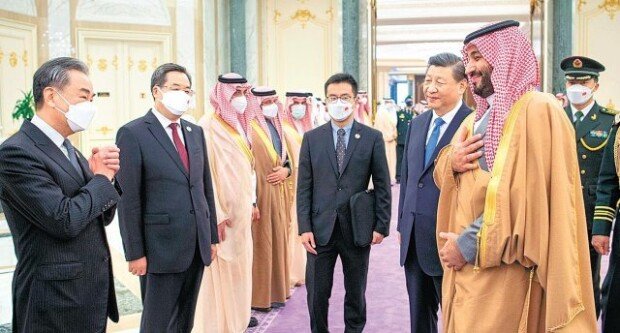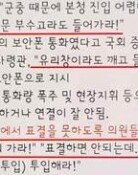China signs 39 trillion won investment agreement with Saudi
China signs 39 trillion won investment agreement with Saudi
Posted December. 10, 2022 07:26,
Updated December. 10, 2022 07:26

China is cooperating with Saudi Arabia, the “eldest brother in the Middle East,” amid intensifying global competition between the U.S. and China. In other words, it is actively trying to take advantage of the relations between the U.S. and Saudi Arabia that recently went sour. The two countries even discussed paying for crude oil in Chinese yuan instead of dollars, a heightened possibility of 'Petro Yuan' (crude oil payment in yuan).
According to the Saudi Press Agency on Thursday (local time), Chinese President Xi Jinping, Saudi Arabia’s King Salman bin Abdulaziz Al-Saud and Prime Minister Mohammed bin Salman had a meeting at the Saudi Royal Palace and signed a comprehensive strategic partnership agreement between the two countries. The scale of economic cooperation between the two countries is projected to increase as they also agreed to strengthen cooperation on China's economic, territorial expansion project, "One Belt, One Road," and Saudi Arabia's national project, "Vision 2030."
With the strengthening relations between China and Saudi Arabia, the possibility of using yuan in crude oil payments has increased,” the Chinese state-run Global Times reported on the same day. Hong Kong's Ming Pao Daily analyzed that signing a large-scale investment agreement between the two countries laid the foundation for the Petro Yuan. However, according to Mingbo and other media outlets, the majority sees that only a part of crude oil will be paid in yuan, but not on a scale to threaten the dollar, the key currency.
Previously on Wednesday, delegations from the two countries signed 34 investment agreements in the fields of green hydrogen, solar power, information technology, cloud technology, transportation, and logistics. The SPA news agency reported that the total amount of the agreements was 110 billion riyals (approximately 38.6 trillion won). This is similar to the 40 trillion won investment memorandum of understanding (MOU) signed by Saudi Arabia with Korean companies when Crown Prince bin Salman visited Korea last month. Fierce competition is expected between Korean and Chinese companies in the Saudi market.
"China sees Saudi Arabia as an important force in a multipolar world," Xi said during the meeting with King Salman. "We're ready to ratchet up strategic communication and comprehensive cooperation with Saudi." King Salman also responded, "China's interest is Saudi's interest. Saudi Arabia is ready to deliver more benefits to the people of both countries." Crown Prince bin Salman supported the “One China” principle.
The investment agreement reportedly includes telecommunications equipment maker Huawei, which is sanctioned by the U.S. Bloomberg analyzed, “The U.S. is asking its allies to sever business with Huawei, and Saudi Arabia’s involvement in a large-scale project is symbolic (for the relationship between the U.S. and Saudi Arabia).” China and Saudi Arabia appear to be getting closer economically and politically, with an agreement to hold a shuttle summit every two years. Saudi Arabia can strengthen cooperation with China and use it as leverage in relations with the U.S. Cooperation with Middle Eastern countries is essential for China to build energy security.
On the same day, Xi held a series of meetings with leaders of Middle Eastern and Islamic countries such as Egypt, Palestine, Sudan, and Kuwait. "People in power from each country supported the one-China principle at the meeting,” China's state-run Xinhua News Agency reported. “They said they supported China on the issues of Hong Kong and the suspicions that China oppressed ethnic minorities in Xinjiang Uyghur."
Ki-Yong Kim kky@donga.com · Eun-A Cho achim@donga.com







